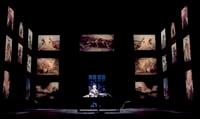Waiting for the complete Stockholm Ring, which will show in January 2008, here is my take on the Stockholm Walküre, which I attended last October at the
Royal Opera in Stockholm:
Director
Staffan Valdemar Holm´s take on this work (based on this Walküre) is largely psychoanalytic. He is not interested in politics and human evolution, but creates a world very similar to what I would´ve imagined to be that of Strindberg and Ibsen. The scenography is by Bente Lykke Möller and the setting is middle to late 19th century, ie. Wagner´s own time.
The first act is takes place in a large kitchen, with dinner plates on the wall, and reminded me distinctly of Nora´s world in Ibsen´s “A doll´s house”. Second act takes place in a room with 19th century romantic paintings on the walls and a pool table in the middle. The room is dark, and through the windows the snowclad mountains can be seen. It´s almost too much Strindberg. The Valkyries were all clad in black dresses in the same dark room with concrete walls and the same windows. Dressed as in the 1850´s (pictured at the bottom of the page).
The cast was quite good:
Nina Stemme was wonderful as Sieglinde,
Hans-Peter König had the voice for Hunding, but is not a very menacing stage present (as in his
Bayreuth Hagen),
Endrik Wottrick was a shrill and disappointing Siegmund (
as he was in Bayreuth this year), while
Martina Dike made a fine Fricka. I had really looked forward to Katarina Dalayman´s Brünnhilde – she seriously has potential to be really outstanding in this part - unfortunately she had cancelled the performance and was replaced by the vocally inadequate and not very interesting
Carolyne Whisnant. Terje Stensvold made an excellent Wotan. I continue to be amazed at this man, who started his international career in his end-50´s after 30 years of (relative) anonymity at the
Royal Norwegian Opera. And next year he has several engagements in London, Vienna and Berlin lined up. His voice was huge and quite steady throughout the entire range.
German conductor
Gregor Bühl was conducting the Royal Swedish Opera orchestra. And disappointingly, the orchestra did not seem to perform according to international standards. Curiously, loudspeakers were placed on the wall next to our seats and they were transmitting the orchestral sound with about ½ seconds delay – which was extremely annoying. The orchestra sounded flat and uninspired throughout, which is my major reservation with this Stockholm Ring so far.
To summarize: The singers generally belong to the top-end of “the usual suspects”, the director´s concept seems interesting, but the orchestra did not quite match the other aspects of the production. Hopefully this will have improved before the premiere of the complete cycle in January.
By the way, the Stockholm opera has implemented the e-tickets, which you may order via internet and print out at home. Excellent service for out of town visitors.
All photos by: Mats Bäcker







